Featured
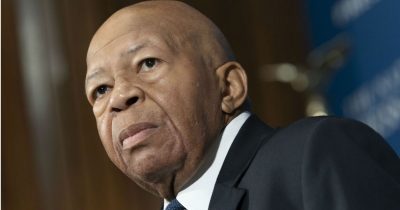 Elijah Cummings has a message for voters ‘from beyond the grave.’ By Nicole Goodkind / Fortune
Elijah Cummings has a message for voters ‘from beyond the grave.’ By Nicole Goodkind / Fortune
Elijah Cummings was born to sharecroppers in the Jim Crow South. He spent his life fighting for civil rights and against segregation and went on to become one of the most influential members of Congress, chairing the House Committee on Oversight and Reform where he was a key figure in the impeachment inquiry against President Donald Trump. “Those who knew him understood that it was values and patriotism that mattered to him, not party or politics,” writes Speaker Nancy Pelosi in the introduction to his new book, We’re Better Than This, written in the final year of his life. “This is a fight for the soul of our democracy,” he wrote of President Donald Trump and the current political situation. He used his last days to write a call to action, which he believed was vital to the future of the United States. Read more
Related: Inside the Republican Plot for Permanent Minority Rule. By David Daley / The New Republic
Related: Republicans, your racism is showing. By Jennifer Rubin / Wash Post
Political / Social
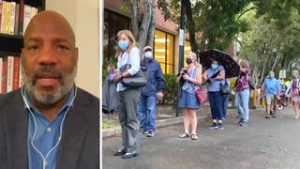 “A Fire That Has Spread Across the Country”: Jelani Cobb on Voter Suppression in the 2020 Election. By Amy Goodman / Democracy Now
“A Fire That Has Spread Across the Country”: Jelani Cobb on Voter Suppression in the 2020 Election. By Amy Goodman / Democracy Now
As tens of millions of people across the U.S. cast their ballots in early voting ahead of the November 3 election, we look at voter suppression efforts with journalist and academic Jelani Cobb. His new “Frontline” documentary “Whose Vote Counts” examines the long lines, record number of mail-in ballots and the legal fights that have marked voting during the pandemic, with a focus on Wisconsin. “This is a state where the presidency was essentially decided in the last election,” says Cobb, a professor of journalism at Columbia University and a contributor to The New Yorker. He describes voter suppression as “a fire that has spread across the country.” Watch here
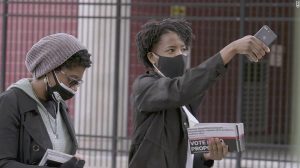 Black women are the backbone of the Democratic Party. And they feel the heavy burden of this election. By Kate Bolduan / CNN
Black women are the backbone of the Democratic Party. And they feel the heavy burden of this election. By Kate Bolduan / CNN
Four years after Donald Trump became the first Republican to win Michigan since 1988, Caldwell-Liddell is working as a one-woman canvassing machine in downtown Detroit to prevent it from happening again, fighting against what she says is an apathy within the community toward politics. Trump’s Michigan victory was one of the biggest surprises of 2016. He won the state by just 10,704 votes. Wayne County, which includes Detroit, the largest Black-majority city in the country, was critical to that result. Hillary Clinton still won the county by a large margin — but she received about 76,000 fewer votes than President Barack Obama did in 2012. Read more
Related: How the push to increase Black voter turnout differs from 2016. By Kate Bolduan / CNN
Related: At Least 67,000 Felons Registered To Vote In Florida, Group Says. By Nick Visser / HuffPost
 Women of color are running for Congress in record numbers. Will Republican and Democratic women change the face of Congress? By Katie Kindelan / ABC News
Women of color are running for Congress in record numbers. Will Republican and Democratic women change the face of Congress? By Katie Kindelan / ABC News
At least 115 women of color — women who identify as Asian or Pacific Islander (API), Black, Latina, Middle Eastern or North African (MENA), Native American, and/or multiracial — are nominees for the U.S. House in 2020, a new record according to the Center for American Women and Politics (CAWP) at Rutgers University. That 115 women includes record numbers of Native American women and Black women and Latinas running. In the current Congress, just 48 out of the 127 women serving are women of color, according to CAWP. Read more
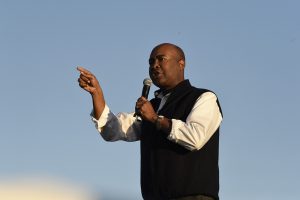 How Jaime Harrison thinks he can knock off Lindsey Graham. By Andrew Desiderio / Politico
How Jaime Harrison thinks he can knock off Lindsey Graham. By Andrew Desiderio / Politico
Jaime Harrison doesn’t want to talk about Donald Trump. In fact, he doesn’t even think he needs to. In his bid to oust Sen. Lindsey Graham, Harrison has raked in tens of millions of dollars from Democrats across the country who despise the president and, by extension, one of his top allies, Graham. But as the president remains popular in South Carolina, the Democratic Senate hopeful has not gone after Trump directly, strategically avoiding the ideological battle lines that could drive voters here to Graham. It’s a gambit that has helped put Harrison within striking distance of a historic upset — and one that could provide a blueprint for Democrats trying to win in the South. Read more
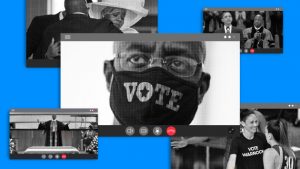 “We Shall Overcome”: Raphael Warnock’s (Not-So-Long-Shot) Bid to Be Georgia’s First Black Senator. By Becca Andrews / Mother Jones
“We Shall Overcome”: Raphael Warnock’s (Not-So-Long-Shot) Bid to Be Georgia’s First Black Senator. By Becca Andrews / Mother Jones
“This is the day that the Lord has made. We have come to rejoice and be glad in it,” says the Reverend Raphael Warnock during his October 4 sermon at Ebenezer Baptist Church. It’s a normal Sunday, with Warnock’s usual opening line, but it’s not really normal. Call it the new normal. The sermon is prerecorded; it plays on the church’s website. Any affirmations of “amen” and “yes, Lord” only emerge within individual living rooms, replacing what was once the underpinning of collective voices with silence. Warnock’s sermons now regularly ask his flock to find connection and community wherever they can, perhaps through church small groups on Zoom, and to continue filling themselves with the satiating word of God. Read more
 What Ice Cube’s collaboration with Trump – and critique of Democrats – reveals. By Malaika Jabali / The Guardian
What Ice Cube’s collaboration with Trump – and critique of Democrats – reveals. By Malaika Jabali / The Guardian
Throughout this election season, the rapper Ice Cube has assumed a self-bestowed mantle as spokesperson for Black politics. He has urged that Black Americans make demands before guaranteeing anyone their vote. “Be skeptical of anybody telling you to just vote … and not get anything for your vote,” he said on Instagram in September. “You vote because your community is getting something.” At the core of the backlash is the suspicion that Cube’s commentary and his chief political initiative, the Contract with Black America, is less about promoting a Black agenda and more about suppressing Black voter turnout for the Democratic party, which Black Americans overwhelmingly support. Read more
 Amy Coney Barrett and ‘I Can’t Breathe.’ By Michael Harriot / The Root
Amy Coney Barrett and ‘I Can’t Breathe.’ By Michael Harriot / The Root
Amy Coney Barrett is a right-wing extremist. She does not believe George Floyd had a right to breathe. She doesn’t believe that screaming the n-word is necessarily “hostile. ”When it comes to police brutality, one does not have to speculate or engage in conjecture to know the opinion of the woman set to take Ruth Bader Ginsburg’s seat on America’s highest court. Barrett may be able to duck and dodge questions about her well-documented anti-choice stance or her pro-death healthcare views, but her judicial record makes one thing obvious: Amy Coney Barrett clearly does not believe Black lives matter. Read more
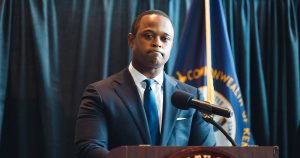 Juror in Breonna Taylor case said grand jury didn’t agree fatal shooting was justified. By David K. Li and Tim Stelloh / NBC News
Juror in Breonna Taylor case said grand jury didn’t agree fatal shooting was justified. By David K. Li and Tim Stelloh / NBC News
A grand juror who heard evidence in the Breonna Taylor probe said Tuesday that the grand jury didn’t agree that her fatal shooting was justified, a disclosure that came after a Kentucky judge ordered records in the proceedings released to show if “publicly elected officials are being honest.” In a statement, “Grand Juror #1,” as the person has been identified by lawyer Kevin Glogower, said that the only charge presented during the proceedings was wanton endangerment. Former Louisville Police Det. Brett Hankison was indicted last month on that charge for firing shots into the apartment of Taylor’s neighbors on March 13. Read more
 COVID deaths of Native Americans linked to underfunded health care. By Dennis Wagner and Wyatte Grantham-Phillips / USA Today
COVID deaths of Native Americans linked to underfunded health care. By Dennis Wagner and Wyatte Grantham-Phillips / USA Today
Few places in the world have been as scarred by the coronavirus pandemic as McKinley County, New Mexico. By September, the county ranked first in the state and sixth nationally for COVID-19 deaths per capita. Roughly 74% of McKinley County’s 71,367 residents are non-Hispanic Native American, mostly Navajo and Zuni. The majority of land within the county’s borders is part of the Navajo Nation reservation. The Navajos, who call themselves Diné, are descendants of people who outlived colonization, smallpox, massacres and resettlement. They take pride in a history of resilience. Read more
Related: Why the Asian American Covid data picture is so incomplete. By Agnes Constante / NBC News
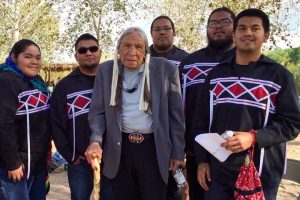 The unique problems facing Native American youths in the criminal justice system. By Calah Schlabach, Jose-Ignacio Castaneda Perez, Matthew Hendley and Layne Dowdall / Slate
The unique problems facing Native American youths in the criminal justice system. By Calah Schlabach, Jose-Ignacio Castaneda Perez, Matthew Hendley and Layne Dowdall / Slate
Generations of historical trauma and increased exposure to violence make young Native Americans more vulnerable to the complicated, often contradictory clutches of the juvenile justice system, legal experts say. Once in the justice system, Native children become lost in a jurisdictional web, a dysfunctional state system and a federal system that has no proper place for them. Read more
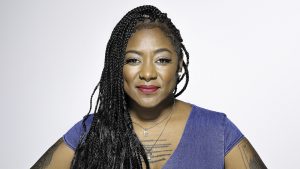 Alicia Garza on the origin of Black Lives Matter. By Mark Whitaker / CBS News
Alicia Garza on the origin of Black Lives Matter. By Mark Whitaker / CBS News
“My hope in helping to put this forward wasn’t to start a movement,” said Garza, the Oakland-based activist who’d coined the phrase “Black Lives Matter.” “My hope was to actually change people’s minds, to change the way that we see ourselves, so that we can stand up in a stronger footing to be able to change the things that we don’t like that are happening around us.” Garza’s soon-to-be released book, “The Purpose of Power,” is her own story of Black organizing and Black resistance. Read more
 At VMI, Black cadets endure lynching threats, Klan memories and Confederacy veneration. By Ian Shapiro / Wash Post
At VMI, Black cadets endure lynching threats, Klan memories and Confederacy veneration. By Ian Shapiro / Wash Post
 Universities Rethink Building Names In The Wake Of Racial Justice Protests. By Lauren Bavis / NPR
Universities Rethink Building Names In The Wake Of Racial Justice Protests. By Lauren Bavis / NPR
Jordan Hall. The large limestone building on IU’s Bloomington campus is named for David Starr Jordan, the university’s seventh president. Jordan is remembered for growing the university and pushing it toward research. But there’s a darker side to his legacy. “David Starr Jordan was… a leader of the eugenics movement,” says University of Michigan professor Alexandra Minna Stern, who has studied the history of eugenics for 20 years. “He also was involved in some of the key organizations that put eugenics on the scientific and professional map.” Because of his role in the U.S. eugenics movement, Indiana University’s board of trustees voted earlier this month to strip Jordan’s name from the building. Read more
 Tulsa begins search for ‘Original 18’ Black people killed in 1921 race massacre. By DeNeen L. Brown / Wash Post
Tulsa begins search for ‘Original 18’ Black people killed in 1921 race massacre. By DeNeen L. Brown / Wash Post
A nearly century-old funeral home ledger lists 18 Black people who were killed in the 1921 Tulsa Race Massacre, one of the worst episodes of racial violence in U.S. history. The White-owned funeral home billed the County of Tulsa in June 1921, charging $25 for the burial of each Black body. The ledger contains the name of Joseph Miller, who was a chauffeur and lived with his wife, Allie, on East Hillside Street. The cause of Miller’s death: gunshot wounds. “We know the names of 13 individuals. We know very little about them,” said Scott Ellsworth, chair of the physical investigation subcommittee of the Tulsa Mass Graves Oversight Committee, which is leading the search for bodies connected to the massacre. Read more
Culture
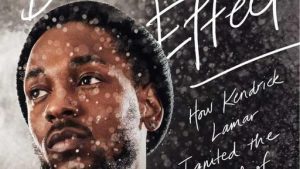 ‘The Butterfly Effect’ charts Kendrick Lamar’s evolution from platinum-selling rapper to protest artist. By Allison Stewart / Wash Post
‘The Butterfly Effect’ charts Kendrick Lamar’s evolution from platinum-selling rapper to protest artist. By Allison Stewart / Wash Post
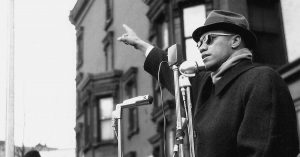 Book Review: The Dead Are Arising,’ by Les Payne and Tamara Payne. By Michael P. Jeffries
Book Review: The Dead Are Arising,’ by Les Payne and Tamara Payne. By Michael P. Jeffries
Les Payne’s “The Dead Are Arising” arrives in late 2020, bequeathed to an America choked by racism and lawlessness. The book’s subject, Malcolm X, knows this place well, though he died in 1965. Readers may pick up this biography hoping for a celebration of Black pride and resilience in the midst of madness. Payne, a Pulitzer Prize-winning journalist who devoted nearly 30 years to the book before his death in 2018, meets these needs intermittently, but that is not his primary goal. Read more
 ‘The Good Lord Bird’ episode three: ‘Mister Fred.’ By Soraya Nadia McDonald / The Undefeated
‘The Good Lord Bird’ episode three: ‘Mister Fred.’ By Soraya Nadia McDonald / The Undefeated
There is the precious gift of Frederick Douglass, as depicted by Daveed Diggs, introduced in episode three: Mister Fred. With Brown wanted by the governor of Kansas and U.S. president James Buchanan, and sizable bounties placed upon his head, he realizes it’s time to head east for strategy, sustenance and resources. And he can find it in Rochester, New York, at the home of Douglass, or as Brown calls him, the “King of the Negroes.” And live like a king Douglass does. He’s got servants, a spacious home filled with an assortment of life’s finer things — and two … I’m just going to call them sister-wife people. Read more
 An imperfect “Lovecraft Country” redefines Black magic for itself and its fans. By Melanie McFarland / Salon
An imperfect “Lovecraft Country” redefines Black magic for itself and its fans. By Melanie McFarland / Salon
Here’s to girls like us who know when to create and when to destroy.” Looking back on the first season of “Lovecraft Country” from the finale, titled “Full Circle,” that line speaks aloud the most solidly realized parts of an uneven if highly enjoyable and ambitious season. A background character speaks it in the seventh episode, “I Am,” and later the credits identify her as Frida Kahlo. Like so much of “Lovecraft Country” this is an example of series creator Misha Green folding history into fantasy to comment on the world as we know it: In “I Am” Aunjanue Ellis’ Hippolyta has willed herself into Josephine Baker’s inner circle at the height of her fame in France, one stop on a self-realization odyssey taken through an interdimensional portal. Read more
Sports
 Baseball’s Race Problem. By Gene Seymour / The Nation
Baseball’s Race Problem. By Gene Seymour / The Nation
What was telling in 1964 was that the racial integration of baseball that the owners had fought—even after Jackie Robinson first took the field for the Dodgers in 1947—had altered more than just major league rosters. Black players brought to major league ball a kind of base-running dynamism and defensive flair that hadn’t been prevalent since the early 20th century, before Babe Ruth went to the New York Yankees in 1920 and inaugurated the boom, so to speak, of home-run appeal. Today, more than half a century after Black Americans helped reenergize the sport, baseball once again has a color problem: a steep decline of African American interest and participation in the game. Read more
 Black former football players at Iowa demand $20 million and the firing of Coach Kirk Ferentz. By Cindy Boren / Wash Post
Black former football players at Iowa demand $20 million and the firing of Coach Kirk Ferentz. By Cindy Boren / Wash Post
Eight Black former football players at the University of Iowa are demanding $20 million in compensation and for Coach Kirk Ferentz and other athletic department officials to be fired, alleging that they were the victims of racial discrimination while playing at the school. Read more
 Clippers Are Hiring Tyron Lue as Their New Coach. By Marc Stein / NYT
Clippers Are Hiring Tyron Lue as Their New Coach. By Marc Stein / NYT
The Clippers on Wednesday were finalizing a five-year contract with Lue to install him as the successor to Doc Rivers, according to the people, who were not authorized to discuss the deal publicly. Lue was en route to Los Angeles, one of the people said, after spending the past three days in Houston interviewing for the Rockets’ coaching vacancy. Read more
Visit our home page for more articles, book/podcast and video favorites. And at the top of this page register your email to receive notification of new editions of Race Inquiry Digest. Click here for earlier Digests.
Use the buttons below to share the Digest in an email, or post to your Facebook, Linkedin or Twitter accounts.